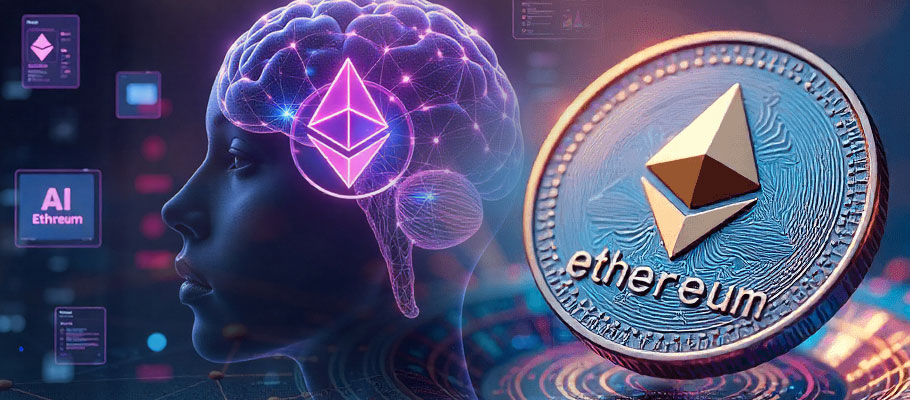
Published: September 17th, 2025
The Ethereum Foundation is taking a bold step: assembling a full-time team dedicated to turning the blockchain into the backbone of artificial intelligence. The new initiative, dubbed dAI team, aims to extend Ethereum's reach beyond finance, positioning it as the infrastructure for AI systems and software development.
The name nods to Ethereum's long-standing principles of decentralisation and democracy. Its mission is twofold: to foster AI development within the crypto ecosystem and to lure off-chain AI heavyweights onto the network. “We want to bridge the gap between blockchain organisations and AI organisations,” wrote Dave Crapis, an Ethereum core developer and the team's leader, on X. Two additional full-time roles are currently being recruited.
Crapis sees the move as acknowledgement that AI will be “key” to Ethereum's longevity. “AI is going to be a big part of human life,” he noted, “and it's going to be a big part of Ethereum's future.”
Out of the chute, the dAI unit will focus on proposals like ERC-8004, a standard that would allow AI agents to discover, verify, and transact with one another across Ethereum. If adopted, it could cement the network as the default settlement layer for the nascent AI agent economy.
Beyond that, Ethereum has its sights set on a more ambitious goal: a decentralized AI stack that ensures the future of artificial intelligence is not concentrated in the hands of a few dominant corporations. This does not imply an overt confrontation with the likes of OpenAI. Rather, the foundation is treating AI as Ethereum's next DeFi moment, a space where grassroots adoption eventually draws in previously wary centralized institutions.
“The focus needs to be on building the best decentralised technology we can offer,” he said. “Ethereum's infrastructure has so far been focused mostly on finance. It needs to be very usable for AI as well.”
Already, the dAI team is involved in research partnerships with major Silicon Valley firms, though details remain under wraps.
Meanwhile, Google has stepped up its own efforts to accelerate the AI agent economy. On Tuesday, it unveiled an open-source protocol for agent payments, supported by crypto heavyweights including the Ethereum Foundation.
The new protocol extends Google's earlier Agent2Agent framework, which sought to standardise interactions between AI agents—automated assistants authorised to perform complex tasks online. Payments, however, were missing. The new system fills that gap, enabling AI agents to transact with users, merchants, and payment providers.
Support comes from both crypto veterans like Coinbase, MetaMask, Mysten Labs, and Eigen Labs; plus traditional Web2 payment companies, including PayPal, American Express, and Etsy. The aim, Google says, is to create a platform- and currency-agnostic “common language for secure, compliant transactions between agents and merchants,” accommodating credit cards, stablecoins, and real-time bank transfers.
To encourage take-up of digital assets on its nascent AI ecosystem, Google has also introduced x402, a crypto-specific extension to Agent2Agent. Ethereum helped craft the software, which dovetails with its own ERC-8004 proposal.
Erik Reppel, head of engineering at Coinbase Developer Platform, framed it in playful terms: “Bringing x402 into AP2 to power stablecoin payments made sense. It's a natural playground for agents to start transacting with each other and testing out crypto rails.”
For Ethereum, the alignment is convenient. The network's ambition to host AI agents dovetails with Google's push to standardise agentic financial interactions. ERC-8004 may soon underpin a variety of payments, while x402 offers early adoption pathways for developers.
The Foundation's foray into AI comes amid growing attention to the health of its treasury companies. A note from Standard Chartered's forex desk on Tuesday argued that digital-asset treasuries are likely to thrive if they can generate staking yields.
BitMine, for instance, recently announced a treasury of 2.15m ETH, worth roughly $9.7bn, or more than twice the holdings of competitor SharpLink Gaming, which sits at 837,230 ETH. Digital-asset treasury (DAT) companies control meaningful portions of major cryptocurrencies: 4% of Bitcoin, 3.1% of Ethereum, and 0.8% of Solana. Their performance, analysts note, is likely to influence coin prices.
Ethereum and Solana may be particularly well-positioned, Standard Chartered suggests, because they offer staking—a way for companies to generate returns from their holdings. Investors are expected to differentiate treasuries based on cash-raising ability, size, and yield generation.
Ethereum's embrace of AI represents a strategic pivot. The network has long been associated with decentralised finance, but now sees a broader opportunity: embedding itself at the infrastructure level of AI, before a few corporate giants consolidate power. By combining ERC-8004, collaboration with Google, and the wider crypto ecosystem, Ethereum is aiming to make AI agents interoperable, transactable, and decentralised.
But there are challenges. Ethereum standards like ERC-8004 are still in development. Regulatory scrutiny of crypto payments is still work in progress. And while Google's and Ethereum's interests currently align, other major AI players could change that. In short, Ethereum is placing a high-stakes wager on a sector that is still in its infancy.
Still, the logic is clear. If DeFi demonstrated that decentralised infrastructure can attract billions in value, AI offers an even larger canvas. The question is whether Ethereum's brand of openness and decentralisation will resonate with developers and institutions building the next generation of software agents—or whether they will default to more centralised platforms.
For now, Ethereum is moving decisively. Its treasury companies are robust, its protocols are evolving, and its Silicon Valley partnerships signal credibility. The Foundation's new dAI team is small, but significant, a signal that the foundation sees AI not as a side project but as central to its vision of a decentralised future.
Whether it will succeed in making Ethereum the bedrock of AI remains uncertain. But the ambition is unmistakable: to ensure that, as artificial intelligence grows in scope and power, it does so on rails that are open, interoperable, and just possibly, owned by no one at all.